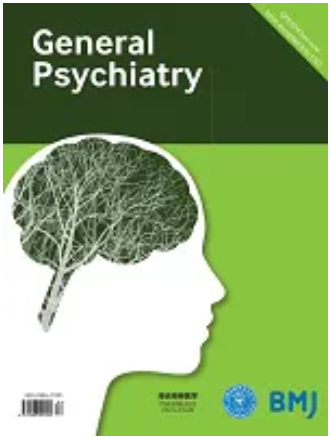糖尿病患者的孤独感、社会隔离与慢性肾病的发生
IF 5.3
3区 医学
Q1 PSYCHIATRY
引用次数: 0
摘要
背景与非糖尿病患者相比,糖尿病患者罹患慢性肾脏病(CKD)的风险明显更高,社会隔离和孤独程度也更高。最近,美国心脏协会强调了在考虑糖尿病患者传统风险因素的同时考虑健康的社会决定因素(SDOH)的重要性。目的 研究英国生物库中糖尿病患者的孤独感和社会隔离与慢性肾脏病发病风险的关系。方法 这项前瞻性研究共纳入了 18 972 名糖尿病患者。根据自我报告的因素编制了孤独和社会隔离量表。采用调整后的 Cox 比例危险模型来研究孤独感和社会隔离与糖尿病患者的 CKD 风险之间的关系。此外,还计算了孤独和社会隔离与传统风险因素在预测 CKD 中的相对重要性。结果 在中位 10.8 年的随访期间,共报告了 1127 例 CKD 病例。在糖尿病患者中,孤独感量表越高,患慢性肾功能衰竭的风险就越高 25%,与传统风险因素无关。在各种孤独感因素中,孤独感是导致慢性肾功能衰竭风险升高的主要因素。与没有孤独感的人相比,感到孤独的人患上慢性肾功能衰竭的可能性增加了 22%。此外,与体重指数、吸烟、体育锻炼和饮食等传统风险因素相比,孤独感在预测慢性肾脏病方面显示出更大的相对重要性。结论 该研究表明,孤独感与糖尿病患者的慢性肾脏病风险之间存在显著的关系,突出了在预防该人群的慢性肾脏病时解决 SDOH 问题的必要性。如有合理要求,可提供相关数据。本研究利用英国生物库资源进行,批准项目编号为 29256。英国生物库将向所有善意研究人员提供源数据,用于符合公共利益的各类健康相关研究,任何人不得优先或独占使用。所有研究人员都必须遵守英国生物库规定的相同申请流程和审批标准。有关访问程序的更多详情,请参阅英国生物库网站()。本文章由计算机程序翻译,如有差异,请以英文原文为准。
Loneliness, social isolation and incident chronic kidney disease among patients with diabetes
Background Individuals with diabetes have a significantly higher risk of developing chronic kidney disease (CKD) and higher levels of social isolation and loneliness compared with those without diabetes. Recently, the American Heart Association highlighted the importance of considering social determinants of health (SDOH) in conjunction with traditional risk factors in patients with diabetes. Aims To investigate the associations of loneliness and social isolation with incident CKD risk in patients with diabetes in the UK Biobank. Methods A total of 18 972 patients with diabetes were included in this prospective study. Loneliness and Social Isolation Scales were created based on self-reported factors. An adjusted Cox proportional hazard model was used to investigate the associations of loneliness and social isolation with CKD risk among patients with diabetes. The relative importance in predicting CKD was also calculated alongside traditional risk factors. Results During a median follow-up of 10.8 years, 1127 incident CKD cases were reported. A higher loneliness scale, but not social isolation, was significantly associated with a 25% higher risk of CKD, independent of traditional risk factors, among patients with diabetes. Among the individual loneliness factors, the sense of feeling lonely emerged as the primary contributing factor to the elevated risk of CKD. Compared with individuals not experiencing feelings of loneliness, those who felt lonely exhibited a 22% increased likelihood of developing CKD. In addition, feeling lonely demonstrated greater relative importance of predicting CKD compared with traditional risk factors such as body mass index, smoking, physical activity and diet. Conclusions This study indicates the significant relationship between loneliness and CKD risk among patients with diabetes, highlighting the need to address SDOH in preventing CKD in this population. Data are available upon reasonable request. This study has been conducted using the UK Biobank Resource, approved project number 29256. The UK Biobank will make the source data available to all bona fide researchers for all types of health-related research that is in the public interest, without preferential or exclusive access for any persons. All researchers will be subject to the same application process and approval criteria as specified by UK Biobank. For more details on the access procedure, see the UK Biobank website ().
求助全文
通过发布文献求助,成功后即可免费获取论文全文。
去求助
来源期刊

General Psychiatry
医学-精神病学
CiteScore
21.90
自引率
2.50%
发文量
848
期刊介绍:
General Psychiatry (GPSYCH), an open-access journal established in 1959, has been a pioneer in disseminating leading psychiatry research. Addressing a global audience of psychiatrists and mental health professionals, the journal covers diverse topics and publishes original research, systematic reviews, meta-analyses, forums on topical issues, case reports, research methods in psychiatry, and a distinctive section on 'Biostatistics in Psychiatry'. The scope includes original articles on basic research, clinical research, community-based studies, and ecological studies, encompassing a broad spectrum of psychiatric interests.
 求助内容:
求助内容: 应助结果提醒方式:
应助结果提醒方式:


